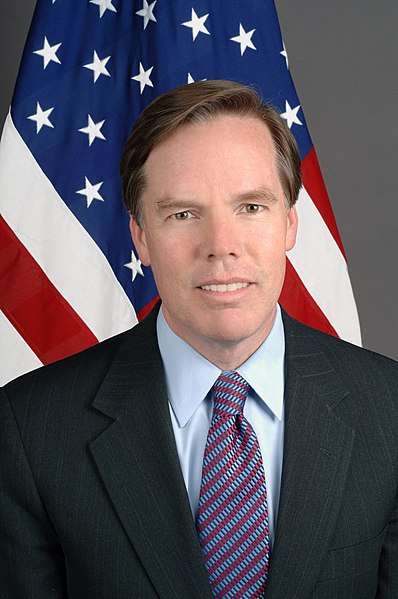Research
Special Projects
Biden Administration International Affairs Personnel Tracker
R. Nicholas Burns

Ambassador to China
On This Page
Ambassador Robert Nicholas ‘Nick’ Burns is a career diplomat with a storied résumé. After graduating with a BA in European History from Boston College and a master’s from Johns Hopkins School of Advanced International Studies in 1980, Burns began his career in the Foreign Service with various postings in the Middle East and North Africa. Under President H.W. Bush, Burns became director of Soviet Affairs in the State Department before transferring to the National Security Council under President Clinton with a similar regional portfolio. He became Spokesperson of the State Department in 1995, holding the position until 1997 when he was appointed Ambassador to Greece. Burns then served as the Ambassador to NATO from 2001 to 2005, returning to D.C. to become the Under Secretary of State for Political Affairs in President W. Bush’s second term.
Before his nomination to be Ambassador to China in August of 2021, Burns taught diplomacy and international politics at the Harvard Kennedy School, lobbied for the Cohen Group, has written for various foreign policy magazines and think tanks, and informally advised Hillary Clinton and Joe Biden’s campaigns on the foreign policy front.
Nicholas Burns’ confirmation hearing was held on October 20, 2021 and he was confirmed by the Senate as U.S. Ambassador to China on December 16, 2021.
Views On China
While Ambassador Burns has been an advocate of negotiation with adversaries in the past, his approach to China calls for a mix of both cooperation and competition. In his confirmation hearing, Burns outlined his vision for engagement with China:
We will compete—and compete vigorously—with the PRC where we should, including on jobs and the economy, critical infrastructure, and emerging technologies…We will cooperate with the PRC where it is in our interest, including on climate change, counternarcotics, global health, and nonproliferation…We also must hold the PRC accountable for failing to play by the rules on trade and investment, including its thefts of intellectual property, use of state subsidies, dumping of goods, and unfair labor practices.
Ambassador Burns also took a hardline stance against a number of issues considered by China to be sensitive domestic matters, saying that “the PRC’s genocide in Xinjiang and abuses in Tibet, its smothering of Hong Kong’s autonomy and freedoms, and its bullying of Taiwan…must stop.” Ambassador Burns, however, does not intend to upend decades of precedent that have built workable diplomatic frameworks with Beijing. For instance, when asked in his confirmation hearing about the prospects of abandoning ‘strategic ambiguity’ and clarifying the U.S. policy towards Taiwan, Burns stated that “we’re better off, and we’ll be more effective, in staying with the ‘One China’ policy of the last four decades.” In typical Biden Administration fashion, Ambassador Burns has also emphasized U.S. engagement with allies and partners as a unique advantage, saying:
The United States must proceed from a position of strength and pursue intense diplomacy—with the People’s Republic of China, and with our allies and partners in the Indo-Pacific, Europe, and around the world. Our alliances and partnerships are a unique comparative advantage for the United States.
Most Recent Actions
- Nicholas Burns has yet to make any official statements in his position as U.S. Ambassador to China.
On October 20, 2021, Nicholas Burns testified before the Senate Committee on Foreign Relations in his confirmation hearing to be U.S. Ambassador to China. In his opening remarks, Burns laid out his vision for U.S. diplomacy with Beijing. In addition to identifying general areas for “cooperation” and “competition” in “[the] complicated and consequential [U.S.-China] relationship, Burns touched on a number of specific issues. Speaking on trade and technology, Burns said:
The PRC seeks to become the most powerful military, economic, and political actor in the Indo-Pacific. We must stand with our allies and partners to uphold a free and open Indo-Pacific— including by maintaining America’s commercial and military superiority in 21st century technologies. We also must hold the PRC accountable for failing to play by the rules on trade and investment, including its thefts of intellectual property, use of state subsidies, dumping of goods, and unfair labor practices. These actions harm American workers and businesses.
Burns then turned to Chinese actions towards Taiwan, saying:
Beijing’s recent actions against Taiwan are especially objectionable. The United States is right to continue to adhere to its one-China policy. We are also right to support the peaceful resolution of disputes, and to oppose unilateral actions that undermine the status quo and stability in the Indo-Pacific.
Ambassador Burns concluded by saying:
…it is important to keep our rivalry with Beijing in perspective…We should have confidence in our own strengths—our scientific and technological capacities, world-class universities and research institutions, our military power, our first-rate diplomatic corps across both the Foreign Service and civil service, and, especially, our values that stand in brilliant opposition to Beijing’s actions. We will succeed if we build our diplomacy around these strengths and remain optimistic about America’s future.
- Nicholas Burns has yet to conduct any notable liaisons or global activity in his position as U.S. Ambassador to China.
Archive
In His Own Words
- “The Diplomat as Gardener,” Foreign Policy, February 19, 2021
- Toward a New Transatlantic Deal?, Event by Carnegie Endowment for International Peace, December 8, 2020
- “On India, the US must think bigger,” The Hill, October 17, 2020
- “How to Lead in a Time of Pandemic,” Foreign Affairs, March 25, 2020
Page Last Updated: December 30, 2021
*None of the personnel in this tracker are associated with the Institute for China-America Studies. All images used on this page are sourced from the official Biden-Harris transition website buildbackbetter.gov or the public domain.*

